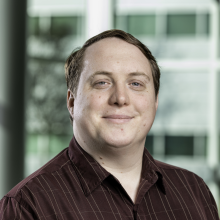-
Title
Postdoctoral Researcher -
Email
hartland1@llnl.gov -
Phone
(925) 423-9507 -
Organization
COMP-CASC DIV-CENTER FOR APPLIED SCIENTIFIC COMPUTING DIVISION
Tucker Hartland is a postdoctoral researcher in the Center for Applied Scientific Computing at Lawrence Livermore National Laboratory. Tucker's work focuses on scalable algorithms for nonlinear optimization and nonlinear equations with underlying partial differential equation (PDE) problem structure for large-scale parallel computations, such as PDE-constrained optimization. Tucker obtained a Ph.D. in Applied Mathematics from the University of California, Merced in 2022 under the supervision of Dr. Noemi Petra, with a thesis on hierarchical algorithms for inverse problems governed by PDEs. Before that, he earned a B.S. in Physics and Applied Mathematics from California State University, Chico in 2016 after having spent time as student and tutor of mathematics and physical sciences at Shasta College.
Tucker has also conducted research on: contact mechanics, turbulence driven mixing of fluids, nonlocal and nonlinear diffusion equations, localized sensitivity exploiting algorithms for inverse problems governed by continental-scale ice-sheet models, nonlinear shallow-water equations for tsunami wave modeling, and infinite symmetry groups of PDEs. Besides his scientific pursuits, Dr. Hartland enjoys long hikes, playing tennis, practicing yoga, and skateboarding. He takes pleasure in traveling, spending time outdoors, and experiencing vegan food.
Ph.D. Applied Mathematics, University of California, Merced
B.S. Physics and Applied Mathematics, California State University, Chico
A constrained multi-fidelity Bayesian optimization method. J. Wang, N.Y. Chiang, T. Hartland, J.L. Peterson, J. Solberg, C.G. Petra. (submitted). arXiv preprint.
AMG with filtering: an efficient preconditioner for interior point methods in large-scale contact mechanics optimization. S. Petrides, T. Hartland, T. Kolev, C.S. Lee, M. Puso, J. Solberg, E.B. Chin, C.G. Petra. (accepted for publication SIAM Journal on Scientific Computing). arXiv preprint.
A scalable interior-point Gauss-Newton method for PDE-constrained optimization with bound constraints. T. Hartland, C.G. Petra, N. Petra, J. Wang. Numerical Linear Algebra with Applications, 32 (6), November, 2025. DOI.
An evaluation of multi-fidelity methods for quantifying uncertainty in projections of ice-sheet mass-change. J. Jakeman, M. Perego, D. Seidl, T. Hartland, T. Hillebrand, M. Hoffman, S. Price. Earth Systems Dynamics, 16, 513-544, April, 2025. DOI.
Further analysis of multilevel Stein variational gradient descent with an application to the Bayesian inference of glacier ice models. T. Alsup, T. Hartland, B. Peherstorfer, N. Petra. Advances in Computational Mathematics 50 (4), 1-29, July, 2024. DOI.
Point spread function approximation of high rank Hessians with locally supported non-negative integral kernels. N. Alger, T. Hartland, N. Petra, O. Ghattas. SIAM Journal on Scientific Computing 46, no. 3: A1658-A1689, May, 2024. DOI.
A strong maximum principle for nonlinear nonlocal diffusion equations. T. Hartland, R. Shankar. Axioms 12, no. 11: 1059, November, 2023. DOI.
PyAlbany: A Python interface to the C++ multiphysics solver Albany. K. Liegeois, M.Perego, T. Hartland. Journal of Computational and Applied Mathematics 425, June, 2023, 115037 DOI.
Hierarchical off-diagonal low-rank approximation of Hessians in inverse problems, with application to ice sheet model initialization. T. Hartland, G. Stadler, M. Perego, K. Liegeois, N. Petra. Inverse Problems 39, June, 2023, 085006 DOI.
Hierarchical approaches for efficient and scalable solution of inverse problems governed by partial differential equations. T. Hartland (Ph.D. dissertation), December, 2022 pdf.
Towards inversion of the basal sliding coefficient for the Humboldt glacier in an uncertain ice sheet model. T. Hartland, M. Perego. (technical report) SAND2022-0653R, Computer Science Research Institute Summer Proceedings 2021, November, 2021, pp 347-359 pdf.
Bound constrained partial differential equation inverse problem solution by the semi-smooth Newton method. T. Hartland, C.G. Petra, N. Petra, J. Wang. (technical report) LLNL-TR-819385, February, 2021 DOI.
Indecomposable vector-valued modular forms and periods of modular curves. L. Candelori, T. Hartland, C. Marks, D. Yepez. Research in Number Theory 4:17, March, 2018.
Two-length-scale turbulence model for self-similar buoyancy-, shock-, and shear-driven mixing. B.E. Morgan, O. Schilling, T. Hartland. Physical Review E 97 (1), 013104, January, 2018 DOI.
Linear long wave propagation over discontinuous submerged shallow water topography. R. Shankar, Y. Sheng, M. Golbek, T. Hartland, P. Gerrodette, S. Fomin, V. Chugonov. Applied Mathematics and Computation 252 pp 27-44, February 2015 DOI.


